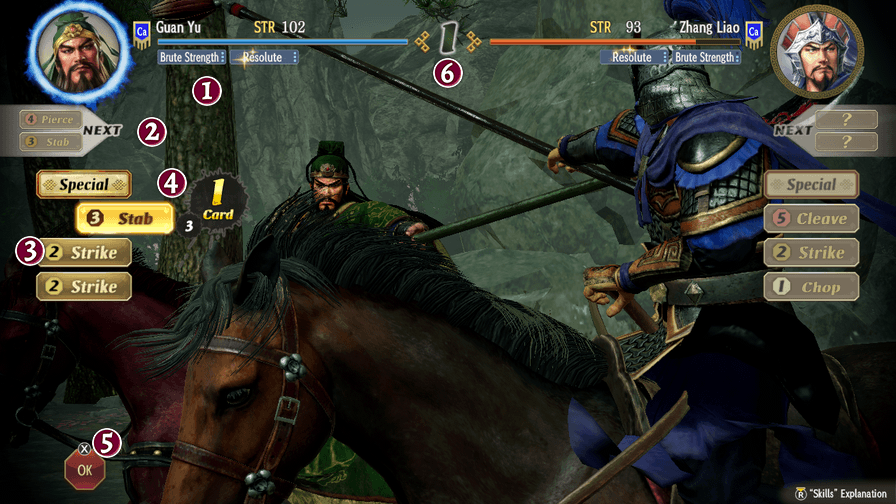Duels and Debates
Duels
Duels between officers can occur during battles and certain events.
You can also choose to participate in a duel via Practice in the Interact section of the menu.
Officers compete in a one-on-one battle, and the officer with the higher STR has the advantage.

 Skills
Skills  Next Cards
Next Cards  Card Select
Card Select  Special Card
Special Card  OK
OK  Turn Number (up to 5 turns)
Turn Number (up to 5 turns)
 Skills
Skills
| Brute Strength | Adds a bonus to the total value of cards and increases attack power when using the special card during a duel. |
|---|---|
| Resolute | Increases attack power on the first turn during a duel. |
 Next Cards
Next Cards
Shows the next cards to be drawn.
 Card Select
Card Select
Select a card from those displayed to use against your opponent.
 Special Card
Special Card
Every officer can use a special card once.
Special cards not only increase the total number of cards by 1, but also increase the damage dealt to the opponent if you win.
 OK
OK
Choose a card, then select OK to deal damage to your opponent.
 Turn Number (up to 5 turns)
Turn Number (up to 5 turns)
The damage that will be dealt by achieving victory increases with every turn.
Rules
At the beginning of a duel, the officer with the higher STR deals a blow to their opponent, and then the card battle begins.
After five rounds, you win by either reducing your opponent's stamina to 0 or having more stamina remaining than your opponent.
Note: If the difference between the officers' STR is great enough, the officer with the lower STR could have their stamina reduced to 0 with a single attack.
Card Selection
Winning a round is determined by the following order: number of cards played > sum of card numbers. The victor will deal damage to their opponent, and the damage is always the same amount.
If the number of cards and the total sum are the same for both officers, it will be a draw with no damage dealt.
You can play multiple cards if you have at least two of the same number or at least three sequentially numbered cards.
Duels during Battles
When a duel occurs during battle, it can greatly affect the unit as a whole.
The morale of the winning officer's unit will increase, and that of the defeated officer's unit will decrease.
If a unit leader loses a duel by having their stamina reduced to 0, their unit will be annihilated.
If a unit leader loses a duel but still has stamina, or if their deputy fought in the duel, the unit will lose soldiers instead.
Officers who lose duels may be injured or die.
Debates
Debates between officers can occur in parliament and during certain events.
You can also choose to participate in a debate via Discussion in the Interact section of the menu.
Officers hold a one-on-one confrontation, and the officer with the higher INT has the advantage.

 Skills
Skills  Next Cards
Next Cards  Card Select
Card Select  Special Card
Special Card  OK
OK  Turn Number (up to 5 turns)
Turn Number (up to 5 turns)
 Skills
Skills
| Orator | Increases attack power when playing consecutively numbered cards during a debate. |
|---|---|
| Rhetoric | Increases attack power when playing cards with the same number during a debate. |
 Next Cards
Next Cards
Shows the next cards to be drawn.
 Card Select
Card Select
Select a card from those displayed to use against your opponent.
 Special Card
Special Card
Every officer can use a special card once.
Special cards not only increase the total number of cards by 1, but also increase the damage dealt to the opponent if you win.
 OK
OK
Choose a card, then select OK to deal damage to your opponent.
 Turn Number (up to 5 turns)
Turn Number (up to 5 turns)
The damage that will be dealt by achieving victory increases with every turn.
Rules
At the beginning of a debate, the officer with the higher INT deals a blow to their opponent, and then the card battle begins.
After five rounds, you win by either reducing your opponent's stamina to 0 or having more stamina remaining than your opponent.
Card Selection
Winning a round is determined by the following order: number of cards played > sum of card numbers. The victor will deal damage to their opponent, and the damage is always the same amount.
If the number of cards and the total sum are the same for both officers, it will be a draw with no damage dealt.
You can play multiple cards if you have at least two of the same number or at least three sequentially numbered cards.